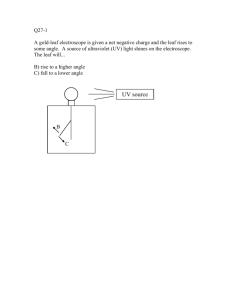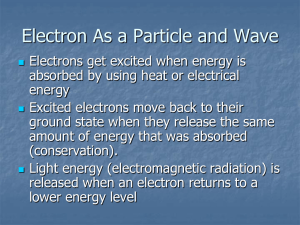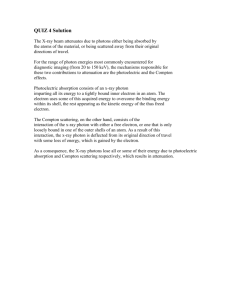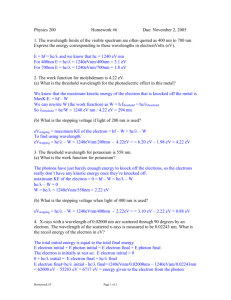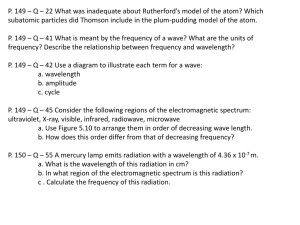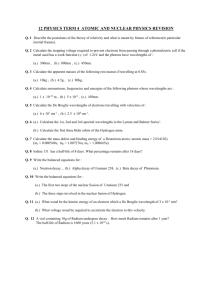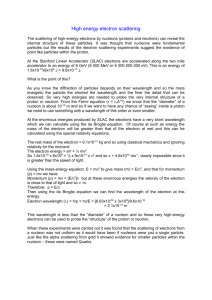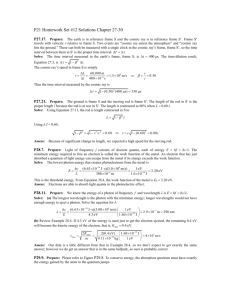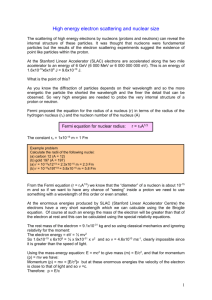Ch27CTans
advertisement
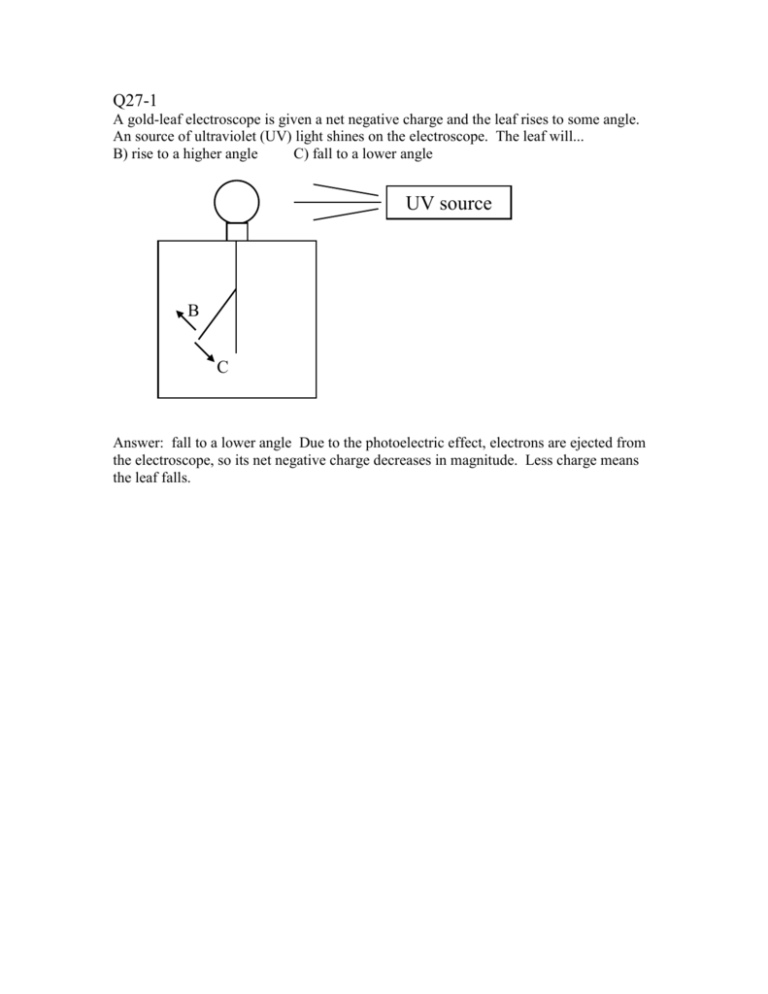
Q27-1 A gold-leaf electroscope is given a net negative charge and the leaf rises to some angle. An source of ultraviolet (UV) light shines on the electroscope. The leaf will... B) rise to a higher angle C) fall to a lower angle UV source B C Answer: fall to a lower angle Due to the photoelectric effect, electrons are ejected from the electroscope, so its net negative charge decreases in magnitude. Less charge means the leaf falls. Q27-2. A photoelectron is ejected from the positive plate of a capacitor. The voltage V across the capacitor is adjustable, and the initial KE of the ejected electron is KEinitial = 3.0 eV. The electron will not make it even half-way to the negative plate of the capacitor if the voltage V is... B) greater than 6V D) greater than 3V C) less than 6V E) less than 3V - - - - - - - V + + + + + + + Answer: greater than 6V. With a very small or zero voltage, the electron will easily make it to the other plate, since there will be little or no electric field to slow it down as it . With a large voltage V, the electron will be quickly turned around. If the voltage difference across the capacitor is 6V, then the change in the PE of the electron when it moves from one plate to the other is 6eV. The electron will only make it to the other plate if its initial KE is at least equal to PE 6eV. When its initial KE (=3eV) is only half that size, it will make it only half way across. See web lecture notes 27-6, 27-7. Q27-3 Monochromatic light of wavelength shines on a metal surface with work function Wo. No photoelectrons are emitted from the surface of the metal, regardless of the intensity of the light. It must be that the wavelength , is.. B) longer than Wo . hc C) shorter than Wo . hc D) longer than hc . Wo E) shorter than hc . Wo Wo . The photoelectric effect equation is hc E hf Wo KE . The threshold for production of photoelectrons is Ethreshold=hf=Wo. Answer: longer than Less energetic photons will produce no photoelectrons. Since, for light, f =c/, then hc hc Wo hf=hc/ and the threshold wavelength is given by . Longer Wo wavelength means lower frequency, less photon energy. CT27-4 The radiometer spins when light shines on it : the black side moves away from the light, and the white side moves toward the light. Is this an indication that light carries momentum? B) Yes, experimental confirmation that light carries momentum! C) No, this experiment does not show that light carries momentum. Answer: NO! The radiometer spins in the direction exactly opposite to that predicted by the model of photon momentum. Photons which are reflected by the white sides have twice the momentum change as photons absorbed by the black side. Therefore, photons striking the white side exert twice the force of photons hitting the black side; the white side should move away from the source. This puzzle is resolved when one realizes there are gas molecules surrounding the paddles. The black side of the paddles gets warmer than the white side (black absorbs all the photon energy) and it heats the surrounding gas molecules. These warmer molecules pound against the black side harder (since heat is a measure of molecular motion: more heat, more motion) and cause it to move away from the light. If all the gas is pumped out of the radiometer, then it spin in the "right" way, due to the momentum of the photons. Q27-5 A proton (charge q=+e, mass m) is moving to the left with a speed v in a uniform external magnetic field which is pointing out of page. The force on the proton is... v proton B) In() C) Right() D) Up() E) Down() B(out) Answer: force is up. Right hand rule: point fingers along v, curl them toward B, thumb points in direction Force if the charge is positive. (If the charge is negative, reverse.) The acceleration of the proton is .. A) evB m B) evB C) evB m D) mevB E) None of these. Answer: acceleration = evB/m. F=ma=qvB (since velocity is perpendicular to B-field). Acceleration a = qvB/m = evB/m. Q27-6 A electromagnetic wave strikes a proton from the left, as shown. The E/M wave is polarized so that the E-field is in the plane of the diagram. There are no forces on the proton, except the forces from the E/M wave. y E x c proton B E B(in) c proton c B(out) E The x-component of the force on the proton due to the E/M wave is .. B) positive (to the right) C) negative(to the left) D) zero. Answers: positive (to the right). When the E-field is up, the proton feels an upward force (FE = qE) and begins moving upward. Once it starts moving, it feels a force due to the Bfield. If velocity is up, and B is out of the page, the right-hand-rule gives a force, due to the B-field, to the right. The same is true when the E-field is down and the B-field is down. This force due to the light is called radiation pressure. It is the propulsion mechanism for interstellar spacecraft that use "solar sails" (found in many science-fiction stories). Since the light can exert a force on a charged particle, the light must carry momentum. Q27-7 A photon with initial energy E and initial momentum of magnitude p collides with an electron which is initially at rest. The electron recoils from the collision, as shown.. After: Before: Eγ, pγ electron (rest) photon electron After the collision the photon's wavelength (compared to before the collision) is B) increased C) decreased D) unchanged. After the collision, the electron's kinetic energy is.. B) zero C) less than E D) equal to E E) greater than E Answers: wavelength is increased. The photon's energy goes down (since it gives some of its energy to the electron). For a photon, E=hf=hc/. As E goes down, the wavelength goes up. The electron's KE is less the E , but greater than zero. The electron picked up some, but not all, of the photon's initial energy. Q27-8 Two electrons, starting at rest, are accelerated across different voltages. Electron 1 is accelerated across a 10V difference. Electron 2 is accelerated across a 40V difference. Which electron has the longer wavelength? B) Electron 1 (10V) C) Electron 2 (40V) D) They have the same wavelength. By what factor do the two wavelengths differ (assuming non-relativistic behavior)? B) Factor of 16. C) factor of 8 D) factor of 4 E) None of these. Answers: the lower voltage electron has the longer wavelength. Lower energy (lower eV) means lower speed (eV=(1/2)mv2), DeBroglie's relation says lower speed means h longer wavelength . mv The wavelengths differ by a factor of 2. The voltages differ by a factor of 4, so the final kinetic energies (eV) differ by a factor of 4. KE=PE, (1/2)mv2=eV. So if the voltages(V) differ by a factor of 4, the speeds (v) must differ by a factor of 2. By DeBroglie's relation, the wavelengths differ by a factor of 2. Q27-9 A partial energy level spectrum of hypothetical element X is given below. Of the transitions listed below, which one produces the shortest wavelength photon? n=6 n=5 n=4 n=3 -1eV -2.5eV -5.2 eV -10eV n=2 -20eV n=1 -50eV B) C) D) E) 62 65 21 41 How many different wavelength photons are produced by transitions among these 6 levels? B) 5 C) 6 D) 15 E) 30 Answer: 41. The energy of the photon emitted is equal to the energy difference of the hc levels involved in the transition. E E hf . So the shortest wavelength will be produced in the transition with the largest energy change, in this case the 41 transition produces a photon of about 45eV (50-5.2eV) larger than any of the other transitions listed. 15 different photon wavelengths are produced. n=6 n=5 n=4 n=3 n=2 n=1 Q27-10 A hydrogen atom in the n=2 state (E=-3.4eV) absorbs a photon and is ionized. Of the photon energies listed below, which are the energies of photons which can ionize a hydrogen atom when it is in its first excited state (n = 2)? E=0eV n=4 n=3 -0.85eV -1.5eV n=2 -3.4eV n=1 -13.6eV 2eV, 3eV, 4eV, 5eV, 10eV B) All of these C) None of these. D): 3eV, 4eV, 5eV, 10eV E) 4eV, 5eV, 10eV Answer: 4eV, 5eV, 10eV. Any photon with an energy greater than or equal to 3.4eV will ionize an atom (in the n=2 state). The electron energy states with energies greater than or equal to zero (corresponding to free, unbound electrons) are not quantized. Free electrons can exist with any energy E>0.
